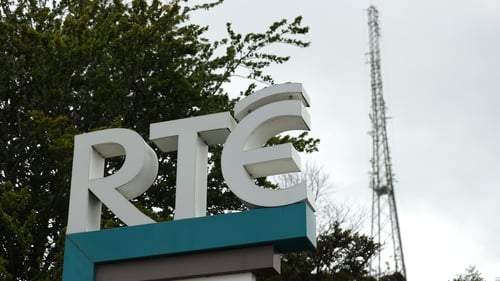Ireland will still compete in this year’s Eurovision Song Contest despite pressure from unions, former contestants and politicians.
Last year’s contest in Malmö was overshadowed by Israeli participation in the contest, with controversy over the lyrics of the Israeli entry and the displaying of Palestinian flags or messages by contestants, making it one of the most politically charged entries in the competition’s history.
With the war in Gaza still ongoing – and comments from the Israeli government this week that they plan to “conquer” Gaza – Israel’s involvement in the competition has led to past Eurovision entrants, unions and members of the opposition.
Calls for Ireland to pull out of the competition in Basel were rebuked by RTÉ on Thursday, with RTÉ boss Kevin Bakhurst confirming that Ireland would be taking part in this year’s competition.
Bakhurst told reporters that while Ireland would not be pulling out, he has sought a meeting with the European Broadcasting Union about the issue.
State broadcasters in Iceland, Slovenia and Spain, who are also part of the European Broadcasting Union, have publicly opposed Israel’s participation in this year’s contest.
In comments transcribed by The Irish Times, Bakhurst said the Israeli public service broadcaster Kan is “under a lot of pressure from the Israeli government, and I don’t want to undermine the Israeli public service broadcaster.”
“It is a very complicated issue and I’m very well aware that a number of EBU members would not be in favour of excluding Israel,” he said.
The RTÉ boss did say he was “appalled” by the ongoing events in the Middle East but noted that Israel’s involvement in the competition was a matter for the European Broadcasting Union, of which RTÉ is a member.
In 2022, following the Russian invasion of Ukraine, Russia was promptly banned from the Eurovision and has yet to return.
In 2013, under orders from President Recep Erdogan, Turkey withdrew from the contest, which opened the door for Australian entry into the competition beginning in 2016.
Australian and Israeli entry into the Eurovision has rankled purists, but both states are paying members of the European Broadcasting Union and thus are allowed entry into the competition.
Last year, Erdogan claimed the competition “encourages social corruption.”
Other Eurovision winners, such as Salvador Sobral (who won in 2017 for Portugal) and Norway’s entry from 2024, also signed the letter, with Norwegian group Gate saying “we were there, and saw what happened.”
Closer to home, National Union of Journalists members at RTÉ have called on the broadcaster to oppose Israeli entry in the contest.
Speaking to the BBC, Dublin branch chair Emma O’Reilly said, “we believe this is RTÉ listening to its staff, but more importantly, listening to public sentiment here in Ireland, which is just outrage at Israel’s actions in Gaza.”
“We collectively — the NUJ and RTÉ — don’t believe Israel should be afforded what is a massive cultural platform,” noting that the Eurovision is quite literally “the international stage.”
Over 70 previous participants, who include songwriters, lyricists and other creatives from across Europe, have accused KAN of being “complicit in Israel’s genocide against the Palestinians in Gaza”.
Charlie McGettigan, one half of Ireland’s winning entry in 1994, said, “I believe that the Israeli government has been and is inflicting genocide on the people of Palestine and for that reason Israel should be barred from competing in this year’s Eurovision Song Contest.”
“It can’t be one rule for Russia and a completely different rule for Israel. You bomb, you’re out,” said Thea Garrett, who represented Malta in 2010.
The letter reads, “rather than acknowledging the widespread criticism and reflecting on its own failures, the EBU responded by doubling down — granting total impunity to the Israeli delegation while repressing other artists and delegations, making the 2024 edition the most politicised, chaotic and unpleasant in the competition’s history.
“Silence is not an option. When authoritarian movements and the far-right are on the rise around the globe, our duty to speak out has only become more pressing. We therefore join together to state that the EBU’s complicity with Israel’s genocide must stop.
Labour TD and foreign affairs spokesperson Duncan Smith said 2the scenes coming out of Gaza in recent days are devastating; it is over 50 days since food and medicine have been allowed in.”
“This siege is collective punishment of an entire population, and Ireland must do everything it can. That means political pressure at EU level, the immediate enactment of the Occupied Territories Bill here at home, and the removal of Israel from international cultural, academic and sporting platforms such as Eurovision and global tournaments.”
Social Democrats TD and foreign affairs spokesperson Sinéad Gibney said, “it is unfathomable that Israel will be allowed to partake in the Eurovision Song Contest while innocent children continue to be slaughtered indiscriminately.”
“I back the NUJ’s call for RTÉ to formally oppose the terror state’s inclusion in the competition.”
“We’ve heard enough talk on Israel’s war crimes – it’s time for action,” she said.
Israeli ambassador to Ireland, Dana Ehrlich, said RTÉ cannot claim to be an “impartial public-service news provider”, when time and time again proving to be anything but that when it comes to Israel.”
“RTÉ’s reporting clearly shows its failure to provide balanced views of the conflict, draw attention to the crimes of Hamas, or provide regular coverage of the plight of Israeli victims, hostages or their families. RTÉ refuses to call Hamas operatives terrorists, yet it actively targets Israel for sanctions,” she wrote on Twitter.
Politics aside, Ireland will be looking to replicate Bambie Thug’s 6th place finish last year – Ireland’s best result since 2000 – with this year’s act, Emmy.
The Norwegian singer will take to the stage for Ireland in the first semi-final on Tuesday, May 13, hoping to secure a spot in the grand final on Saturday, May 17.
